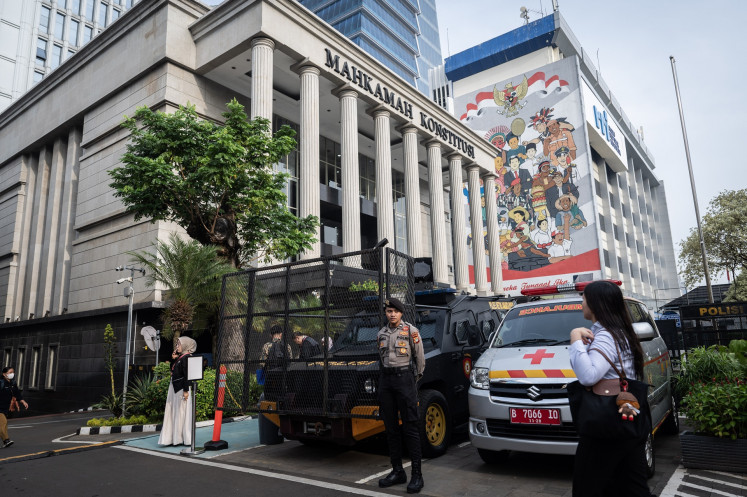RI’s private equity funding to bounce back: Bain & Co.
Recovery likely from heightened interest in internet economy
Change text size
Gift Premium Articles
to Anyone

L
ast year, Indonesia and other Southeast Asian nations saw their private equity (PE) investments and exits dip as a result the COVID-19 pandemic. However, the outlook for funding this year may be more hopeful, with a study revealing recovery is likely to come from heightened interest in the internet economy and the opportunities to go public with a blank-check company.
Based on the 2021 “Southeast Asia Private Equity Report”, commissioned by Singapore-based business consultancy firm Bain & Company, deal activity and value in the region dropped off considerably when compared with other countries in the Asia-Pacific region because of COVID-19.
Investment activity in Southeast Asia went down from 115 deals in 2019 to 106 last year. The region also saw its deal value decrease by 25 percent from US$12 billion to $9 billion over the same period.
“This great level of slowdown was driven by unique regional characteristics. First, the difficulty of completing due diligence when cross-geographic travel is restricted, [given that] Southeast Asia is a collection of countries,” Usman Akhtar, a partner in Bain & Company’s private equity practice, said in a recent press conference.
He also said that the different responses to COVID-19 among Southeast Asian nations had made it difficult for investors to formulate new investment plans.
Indonesia, the region’s largest economy and one of its fastest-growing markets for the digital economy, saw its PE investment deals contract moderately compared with other countries. Its investment deals were down by 11 percent in 2020 compared with the last five-year average, while investment deal value was down 34 percent over the same period.
By comparison, Malaysia saw its investment deal count go down 55 percent and its investment deal contracting by 89 percent.
Even so, the study noted that Southeast Asian nations were also seeing investments pick up in the second half of 2020. Total PE investment in the first six months of last year stood at $2.9 billion but reached $6 billion in the second half. “This hopefully will be a good sign of recovery going into 2021," Akhtar said.
The report found that companies in Southeast Asia, especially in Indonesia, were increasingly showing interest in internet and technology start-ups.
Since 2018, the internet and technology segment has dominated Southeast Asia’s deal count. Last year, the segment made up 61 percent of total deals.
Meanwhile, funding of technology companies in Indonesia such as Gojek, Tokopedia and Traveloka also made up most of the total value of deals in the country for the past three years.
In particular, Bain’s survey on Southeast Asia-focused investors revealed that they were increasingly focused on “digitally accelerated” sectors such as financial technology (fintech), education technology and telemedicine for investing in Indonesia in the next three to five years.
“While there were many challenges in the private equity market in 2020, including a decline in the overall investment market, the continued growth that we are seeing in the internet or tech industry is a cause for optimism,” Akhtar noted.
Read also: RI fintech firms continue winning streak in fundraising
According to “Startup Report 2020” by innovation consulting firm DSInnovate, tech companies in e-commerce, ride-hailing, on-demand services and fintech were in the top-five segments that received the highest total sum of investments over the past three years, exceeding $22 billion.
Meanwhile, non-technology segments such as travel, new retail, health and coworking spaces received less than $5 billion over the same period.
The Bain & Co. report also noted that start-up exits were down across all Southeast Asia countries, with only eight exits last year valued at $3 billion in total, compared with 26 exits worth $7 billion in 2019.
Indonesia saw only two start-ups going the initial public offering (IPO) route last year; travel start-up Pigijo and fintech company Cashlez.
The country’s unicorns have also been flirting with the idea of going public. The recent merger between Gojek and Tokopedia was done in preparation for their new entity, GoTo, which plans to make an IPO. Meanwhile, companies such as e-commerce giant Bukalapak and online travel agency Traveloka are weighing the possibility of making an IPO through special purpose acquisition companies (SPACs).
Read also: IDX to allow SPACs, hopes Indonesian unicorns will go public locally
Akhtar said that it was possible that SPACs could ramp up the number of start-up exits in Indonesia. However, without any specific regulatory framework in place, it was still “tricky to tell [people] how it is going to pan out,” especially since most SPAC deals happen in the United States.
Bain’s senior advisor for the global private equity practice, Suvir Varma, said that aside from seeking out prominent SPAC promoters, companies were scouting for locations to go public in order to increase their attractiveness. But even this would depend on solid engagement.
“I think part of [the indication as to] whether SPACs will pick up or not will also come down to the robustness of these exchanges in this part of the world, not just the underlying attractiveness of the company,” he said.









